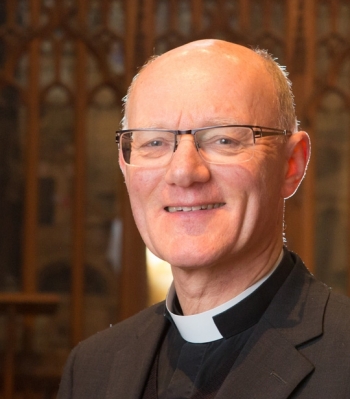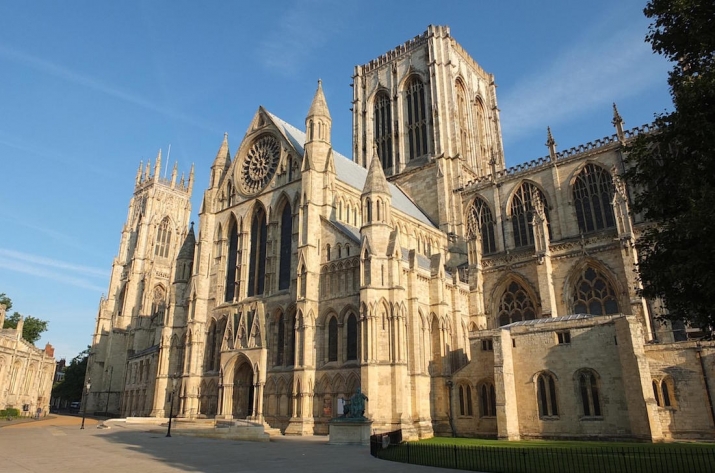A decision by senior clergy at one of England’s most venerable cathedrals to quietly introduce classes in Zen meditation has unexpectedly ruffled the feathers of some of the Church of England’s more conservative members, who have demanded that the fortnightly silent meditation sessions be canceled on the grounds of religious incompatibility.
The Zen group, which usually numbers about 20 people, has been meeting in a room on York Minster’s grounds for about 90 minutes for the past two years. The informal sangha is the initiative of Reverend Canon Dr. Christopher Collingwood, the cathedral’s canon chancellor, who describes himself as “religiously bilingual” in his approach to his Christian beliefs and as having “a foot in more than one religious camp.” (The Telegraph)
Collingwood noted that until recently, his introduction of Zen ideas into the Church of England had been well received. “Funnily enough I have been quite surprised at the number of people who are really interested in it, who don’t seem to raise their eyebrows,” he said. (The Telegraph)
Arguing that there are natural parallels between the Christian and Buddhist contemplative traditions, Collingwood observed that Christian interest in Zen Buddhism “has been going on in the Roman Catholic church for 50 years and more,” since at least the Second Vatican Council (1962–65), when Roman Catholics were encouraged to learn from Asian spiritual traditions in areas such as meditation. (The Telegraph)
 Reverend Canon Dr. Christopher Collingwood. From yorkminister.org
Reverend Canon Dr. Christopher Collingwood. From yorkminister.org“I think particularly what Roman Catholic missionaries discovered was that it resonated with the Christian contemplative and mystical tradition,” he said. “With figures like St John of the Cross [the 16th Century Spanish mystic] you have got a praying [sic] without words, beyond concepts, beyond images.
“When people are meditating in Zen who are Christian I think the focusing on the breath coincides with the idea of the Holy Spirit. In the Bible, the word, both in the Hebrew and Greek, can be translated as ‘breath’, ‘spirit’ or ‘wind.’ There is a very deep connection there - that breath is the Spirit within us. I would say that the focus on breath is attending to the Holy Spirit.” (The Guardian)
However, Collingwood’s reassurances have failed to mollify all quarters of England’s Christian community. Andrea Williams, chief executive of the evangelical pressure group Christian Concern and a member of the General Synod, the highest government body of the Church of England, rejected Collingwood’s suggestion that Zen practices were compatible with Christian teachings.
“The idea that we can pick and choose practices from other religions is found nowhere in the Bible. We cannot come into God’s presence without the one mediator, Jesus Christ. To suggest otherwise is dangerously false and violates God’s command to love and serve Him only,” Williams said. “Buddhism contrasts sharply with Christian teaching about God. The two are incompatible. To try to mix them is deceptive and dishonors Jesus Christ.” (Christian Concern)
In a critical blog post, Dr. Ian Paul, a conservative evangelical member of the Archbishops’ Council, a central administrative body within the Church of England, accused Collingwood of being “in breach of his ordination vows,” in which he promised to minister “faithfully” so that people in his care can be “defended against error and flourish in the faith.” (Christian Today)
“As long as there are, in effect, no boundaries to what is considered orthodox Anglican Christian belief, and what it is acceptable for clergy to teach—particular clergy in prominent roles—and no mechanism for bishops to act to address this, then the Church is hamstrung in its commitment to discipleship and evangelism,” Paul said. (Christian Today)
The dean of York, Vivienne Faull, who is responsible for the running of the York Minster cathedral, expressed her support for Collingwood’s initiative, saying the meditation sessions were “an opportunity for Christians and others to come together and learn about and explore Zen meditation practices and the congruence of Zen with the Christian faith.” She emphasized that the group was not a religious order and had never met within the cathedral itself, adding, “The chapter of York would not give permission for any such religious order to be set up at York Minster.” (The Guardian)
See more
York Minster brings in Zen Buddhism, quietly (The Telegraph)
York Minster criticised for allowing Buddhist meditation (The Guardian)
Buddhist Meditation offered at York Minster (Christian Concern)
Evangelical Christians condemn introduction of Zen Buddhism to York Minster (Christian Today)
















